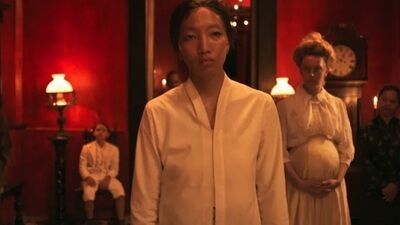The most important fact in play is that Jan has a young son named Karel (Rio Kaj Den Haas) by way of his illicit relationship with an Indonesia plantation worker named Siti (Hayati Azis). When the old man dies, his son Cornelis (Florian Myjer) and his pregnant wife Josefien (Lisa Zweerman) leave the Netherlands to sail around the world to join his widow Agathe (Renée Soutendijk) in the muddy jungle to figure out what happens next. What happens next is anger, resentment, and skullduggery, triggered by the revelation that Jan has decided to leave everything to Karel. Grief drives people to extreme behavior. Grief coupled with an expectation of wealth kicks things up a notch, into danger and derangement. A plantation worker named Reza (Muhammad Khan), who has been agitating on behalf of his fellow workers and even inspired them to go on strike over nonpayment of wages, becomes a key player in the story, positioning himself as somebody who won’t merely take the fight to The Man (and his women) but can charm Siti into leaving with Karel and starting a new life as his partner.
The movie is, alas, thuddingly obvious during its first third. Every basic observation about the absurdities and evils of colonialism is not merely presented but practically served up on a silver platter under a spotlight, as when a cockroach crawls through the remnants of a fancy family dinner, or when Josefien (Lisa Zweerman) disembarks from a carriage that’s gotten stuck in on a wet road and the movie takes its time observing her fancy boots getting dirty in the mud. It’s not that anything the movie is telling us rings false, but that it’s all things we probably already knew, and that are nonetheless presented as subversive and shocking.
But things start to get interesting once Jan posthumously acknowledges in writing that he’s had a son with his mistress and that the lad will inherit everything. After that, “Sweet Dreams” becomes something faintly akin to a Coen brothers movie in which obtuse, deluded, and/or repulsive people plot against each other and get what they deserve, whether it’s because the small and petty world that had previously overlooked their glaringly obvious flaws collectively decides to pay attention to them and pass judgment, or because characters who think they’re ruthless or clever turn out to be dumbasses.
